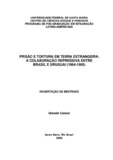| dc.creator | Cassol, Gissele | |
| dc.date.accessioned | 2008-11-26 | |
| dc.date.available | 2008-11-26 | |
| dc.date.issued | 2008-04-16 | |
| dc.identifier.citation | CASSOL, Gissele. Arrest and torture in foreign land: the repressive collaboration among Brazil and Uruguay (1964-1985). 2008. 119 f. Dissertação (Mestrado em Direito) - Universidade Federal de Santa Maria, Santa Maria, 2008. | por |
| dc.identifier.uri | http://repositorio.ufsm.br/handle/1/9689 | |
| dc.description.abstract | Latin America was made stage for the quarreling between the capitalist and socialist systems starting circa the middle of the century XX, during the Cold War. Such
ideological struggle had as one of their main outcomes the ascension of civil-military dictatorships in many Latin countries. Those regimes, fundamentally based on the
North American National Security Doctrine (NSD), they have accomplished a brutal Terror of State to face their political opponents. The combat to the internal enemy
extolled by NSD provoked the extinction of the political borders; in its place, they would just be delimited ideological borders. Following that logic it was the formation of a web of relationships among the repressive apparatuses of those dictatorships, whose apex has been established with the creation of the Condor Operation, in 1975. It is in that context that locates the gist of this dissertation: the existent repressive collaboration between Brazil and Uruguay during the period understood between 1964 and 1985. Although Uruguay became a dictatorship only starting from 1973, since ends of the decade of 1960 it already cooperated with the Brazilian regime watching, arresting and even torturing Brazilian political opponents exiled in his/her territory. The high number of cases of arrested Brazilians in Uruguay in that period attests that relationship and evidences that the repressive collaboration among those two countries did not depend exclusively on the Condor Operation even though
having been facilitated by it later. The present study intends to demonstrate, starting from the analysis of cases of arrested Brazilians in Uruguay and of arrested
Uruguayans in Brazil between 1964 and 1985, how the repressive collaboration among those two countries was, under the scope of NSD and of the practices of
Terror of State. | eng |
| dc.format | application/pdf | por |
| dc.language | por | por |
| dc.publisher | Universidade Federal de Santa Maria | por |
| dc.rights | Acesso Aberto | por |
| dc.subject | Brasil | por |
| dc.subject | Uruguai | por |
| dc.subject | Ditadura civil-militar | por |
| dc.subject | Colaboração repressiva | por |
| dc.subject | Brazil | eng |
| dc.subject | Uruguay | eng |
| dc.subject | Civil-military dictatorship | eng |
| dc.subject | Repressive collaboration | eng |
| dc.title | Prisão e tortura em terra estrangeira: a colaboração repressiva entre Brasil e Uruguai (1964-1985) | por |
| dc.title.alternative | Arrest and torture in foreign land: the repressive collaboration among Brazil and Uruguay (1964-1985) | eng |
| dc.type | Dissertação | por |
| dc.description.resumo | A América Latina se fez palco para as batalhas travadas entre os sistemas capitalista e socialista a partir de meados do século XX, durante a Guerra Fria. Esse enfrentamento ideológico teve como um de seus principais desdobramentos a
ascensão de ditaduras civil-militares em muitos países latinos. Esses regimes, alicerçados fundamentalmente sobre as bases da norte-americana Doutrina de Segurança Nacional (DSN), lançaram mão de um brutal Terror de Estado para
enfrentar seus opositores políticos. O combate ao inimigo interno , preconizado pela DSN, provocou a extinção das fronteiras políticas; em seu lugar; delimitar-se-iam
apenas fronteiras ideológicas. Dentro dessa lógica, esteve a formação de uma teia de relações entre os aparatos repressivos dessas ditaduras, cujo ápice se daria com
a formação da Operação Condor, em 1975. É nesse contexto que se situa o cerne desta dissertação: a colaboração repressiva existente entre Brasil e Uruguai durante
o período compreendido entre 1964 e 1985. Embora o Uruguai se tornasse uma ditadura somente a partir de 1973, desde fins da década de 1960 já cooperava com o regime brasileiro, vigiando, prendendo e até torturando opositores políticos
brasileiros exilados em seu território. O elevado número de casos de brasileiros presos no Uruguai, nesse ínterim, atesta essa relação e evidencia que a colaboração repressiva entre esses dois países não dependeu exclusivamente da
Operação Condor, mesmo tendo sido por ela facilitada mais tarde. O presente estudo pretende demonstrar, a partir da análise de casos de brasileiros presos no Uruguai e de uruguaios presos no Brasil entre 1964 e 1985, como se deu a
colaboração repressiva entre esses dois países, à luz da DSN e das práticas de Terror de Estado. | por |
| dc.contributor.advisor1 | Konrad, Diorge Alceno | |
| dc.contributor.advisor1Lattes | http://lattes.cnpq.br/6649023072655942 | por |
| dc.contributor.referee1 | Padrós, Enrique Serra | |
| dc.contributor.referee1Lattes | http://lattes.cnpq.br/7358158403962326 | por |
| dc.contributor.referee2 | Chirico, Selva Lopéz | |
| dc.contributor.referee2Lattes | http://lattes.cnpq.br/2575787722574721 | por |
| dc.creator.Lattes | http://lattes.cnpq.br/2357790782553700 | por |
| dc.publisher.country | BR | por |
| dc.publisher.department | Direito | por |
| dc.publisher.initials | UFSM | por |
| dc.publisher.program | Programa de Pós-Graduação em Integração Latino-Americana | por |
| dc.subject.cnpq | CNPQ::CIENCIAS SOCIAIS APLICADAS::DIREITO | por |


